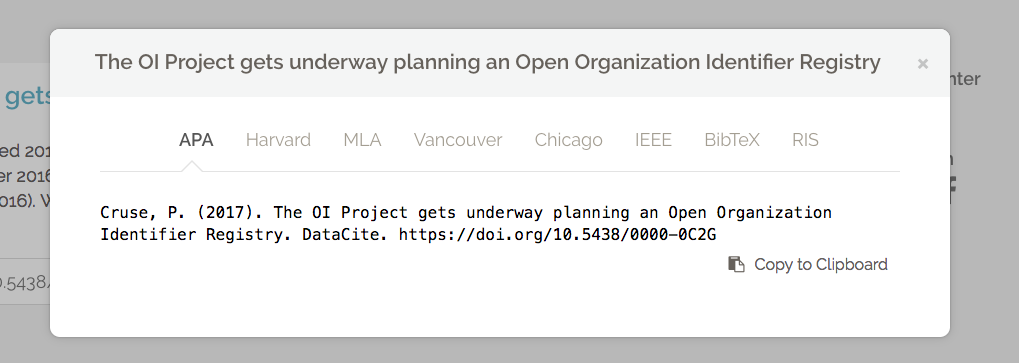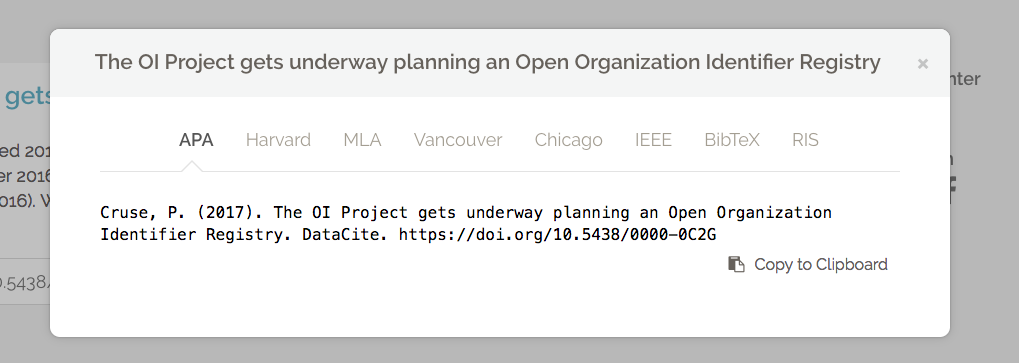While it is a best practice for DOIs (expressed as URL) to send the user to the landing page for that resource (Starr et al., 2015), sometimes we want something else: metadata, e.g. to generate a citation, or to go to the content itself. The easiest way to do that is to use DOI content negotiation.
In this blog post we will give an introduction to DOI content negotiation, describe some of the issues we identified with our current implementation, and announce a major service update addressing these issues and launching in two weeks.
DOI Content Negotiation uses the HTTP Accept header together with the DOI expressed as URL. This is best explained by an example, using a recent post from this blog:
curl -LH "Accept: application/x-bibtex" https://doi.org/10.5438/0000-0C2GThis command returns BibTeX metadata for this DOI:
@misc{https://doi.org/10.5438/0000-0C2G,
doi = {10.5438/0000-0C2G},
url = {https://doi.org/10.5438/0000-0C2G},
author = {Cruse, Patricia},
publisher = {DataCite},
title = {The OI Project gets underway planning an Open Organization Identifier Registry},
year = {2017}
}Or maybe you want to go directly to the content, in this case the JATS XML for the blog post (Fenner, 2017c):
curl -LH "Accept: application/xml" https://doi.org/10.5438/0000-0C2GSometimes it is easier to use a normal link instead, e.g. in a web browser where sending HTTP headers is a bit involved.
curl -L https://data.datacite.org/application/x-bibtex/10.5438/0000-0C2GFor this to work you have to go directly to the DataCite content negotiation service at data.datacite.org instead of using the doi.org DOI proxy.
The most popular use of DOI content negotiation is citation formatting in any of the 1000s of citation styles provided by the Citation Style Language (CSL) project. For this we combine DOI content negotiation, which generates a JSON file from the metadata in a format that CSL understands (Citeproc JSON), with our DOI citation formatting service, which generates the formatted citation:
curl -LH "Accept: text/x-bibliography; style=apa" https://doi.org/10.5438/0000-0C2GThis command returns a citation formatted in APA style:
Cruse, P. (2017). The OI Project gets underway planning an Open Organization Identifier Registry. DataCite. https://doi.org/10.5438/0000-0C2GThere is an easier way to get this information from DataCite if you don't feel comfortable using the command line. First find the DOI you want to cite in DataCite Search, e.g. https://search.datacite.org/works/10.5438/0000-0C2G in this case.

Then click on the Cite button and select one of several popular citation styles. We again pick the APA style:

This is the same formatted citation we saw earlier, as DataCite Search is using the content negotiation and citation formatting services in the background. These services have been around for several years, and we work together with other DOI registration agencies on this. The citation service in DataCite Search for example is based on Crossref open source code originally written for Crossref Metadata Search.
Upcoming Changes
There is still room for improvement of the content negotiation service. As part of work in the EC-funded THOR project (Farquhar et al., 2015) we took a closer look at what you can and can't do with DOI content negotiation. We identified a number of gaps and will address them by launching an updated content negotiation service in May.
Many content types only supported with required metadata
The current DataCite content negotiation only supports the required metadata (identifier, creator, title, publisher, publicationYear, resourceTypeGeneral) for most content types. This means that even for something as straightforward as BibTeX, DataCite is not converting the supported optional metadata such as description, subject/keywords, version or license. And for rich metadata such as RDF, a long list of properties is not converted.
Limited person name parsing
Person names are very difficult to parse, in particular when not using the optional properties givenName and familyName introduced in DataCite Schema 4.0 last year (DataCite Metadata Working Group, 2016). But proper parsing is important for citations, as different citation styles use different formatting rules for names. And BibTex expects a particular format that is hard to support without proper person name parsing.
Better support for consistent metadata across DOI registration agencies
Although content negotiation is supported by several DOI registration agencies, there is only limited support for common metadata beyond the basic citation metadata. This makes it harder than it should it to combine metadata records from different DOI registration agencies. The current RDF support is limited, and no DOI registration agency is offering content negotiation that converts metadata from another registration agency.
Support for additional content types
The list of supported content types could be much longer, from emerging metadata standards such as schema.org or scholix to community-specific standards such as DDI for social sciences, DATS for the life sciences (Sansone et al., 2017), or codemeta for software.
Unrecognized content types raise an error
When the DataCite DOI content negotiation encounters an unrecognized content type, it returns a 406 Not Acceptable error. This means that it is impossible to implement content negotiation downstream at the data center, as all content negotiation requests will be redirected to DataCite. Data centers can register their custom content types in the DataCite MDS using the media API endpoint, but this feature is unfortunately not widely used.
DataCite has rewritten most of the code of the content negotiation service, and has extracted out the metadata conversion into a standalone library (Fenner, 2017a) that can also be used locally via the command line. The new service is currently in final testing at https://data.test.datacite.org, and we plan to launch this into production ion May 9th. We have worked on all the limitations listed above, and some of the highlights include:
- extensive support for schema.org/JSON-LD as a common metadata standard independent of a particular DOI registration agency
- extensive RDF support as XML or Turtle via schema.org metadata
- tested with DOIs from DataCite and Crossref, supports conversion of Crossref metadata to DataCite metadata
- BibTeX and RIS files have proper file extension (.bib and .ris) for easier import into other applications.
- new content type
codemeta, other content types will be added in the coming months based on user feedback - available as open source software via Github (Fenner, 2017b) and Docker Hub.
There is one breaking change that users should be aware of: the content type text/html will no longer be supported, as the DOI proxy always forwards requests with this content type to the URL registered in the handle system. Users who want to see a HTML representation of the DOI metadata should go to DataCite Search, i.e. https://search.datacite.org/works/10.5438/0000-0C2G instead of https://data.datacite.org/10.5438/0000-0C2G. We will be improving the information shown for a single DOI in DataCite Search in the coming months, and appreciate user feedback.
Acknowledgments
This blog post was originally published on the DataCite Blog.
References
DataCite Metadata Working Group. DataCite Metadata Schema Documentation for the Publication and Citation of Research Data v4.0. Published online 2016:45 pages. doi:10.5438/0012
Farquhar A, Aryani A, Brown J, et al. Technical and Human Infrastructure for Open Research (THOR). Published online 2015. doi:10.5438/6423
Fenner M. Bolognese: a Ruby library for conversion of DOI Metadata. Published online February 25, 2017. doi:10.5438/N138-Z3MK
Fenner M. Content-Negotation: an API for DOI content negotiation. Published online April 28, 2017. doi:10.5438/T1JG-HVHN
Fenner M. Using Schema.org for DOI Registration. Published online January 9, 2017. doi:10.5438/0000-00CC
Sansone SA, Gonzalez-Beltran A, Rocca-Serra P, et al. DATS: The Data Tag Suite to Enable Discoverability of Datasets. Bioinformatics; 2017. doi:10.1101/103143
Starr J, Castro E, Crosas M, et al. Achieving human and machine accessibility of cited data in scholarly publications. PeerJ Computer Science. 2015;1:e1. doi:10.7717/peerj-cs.1


